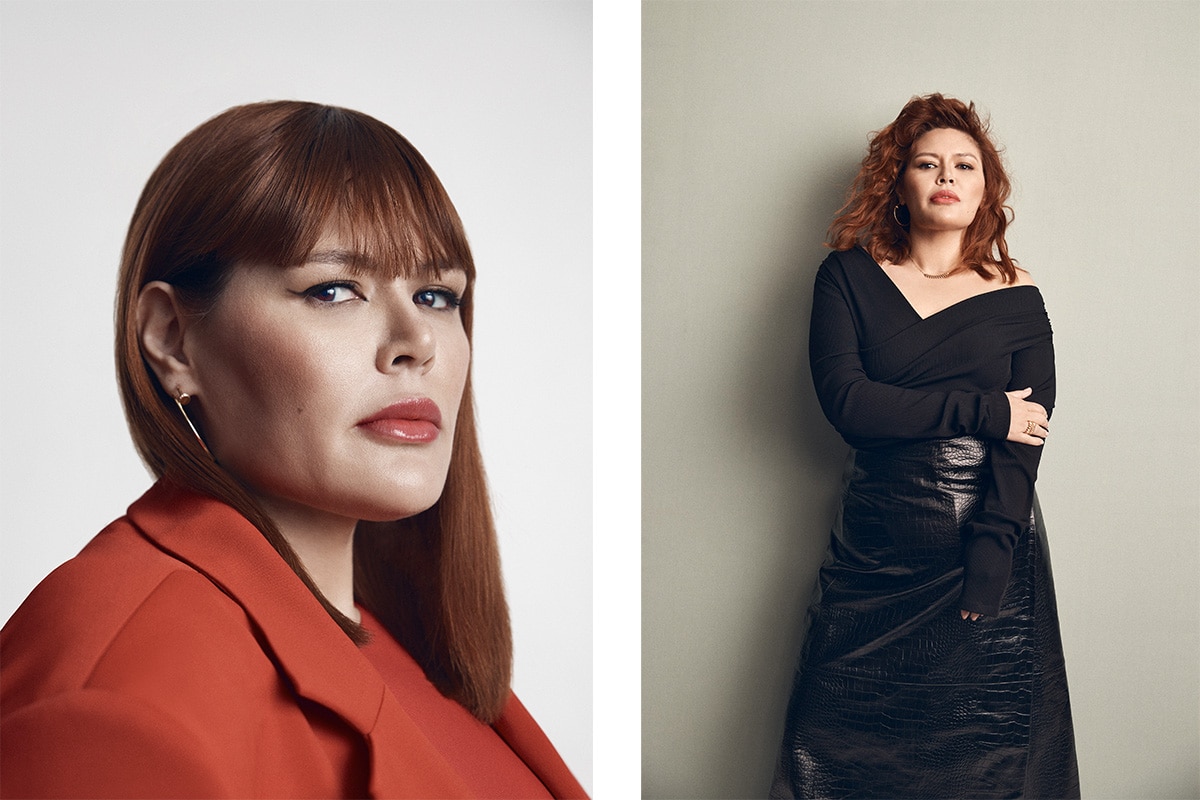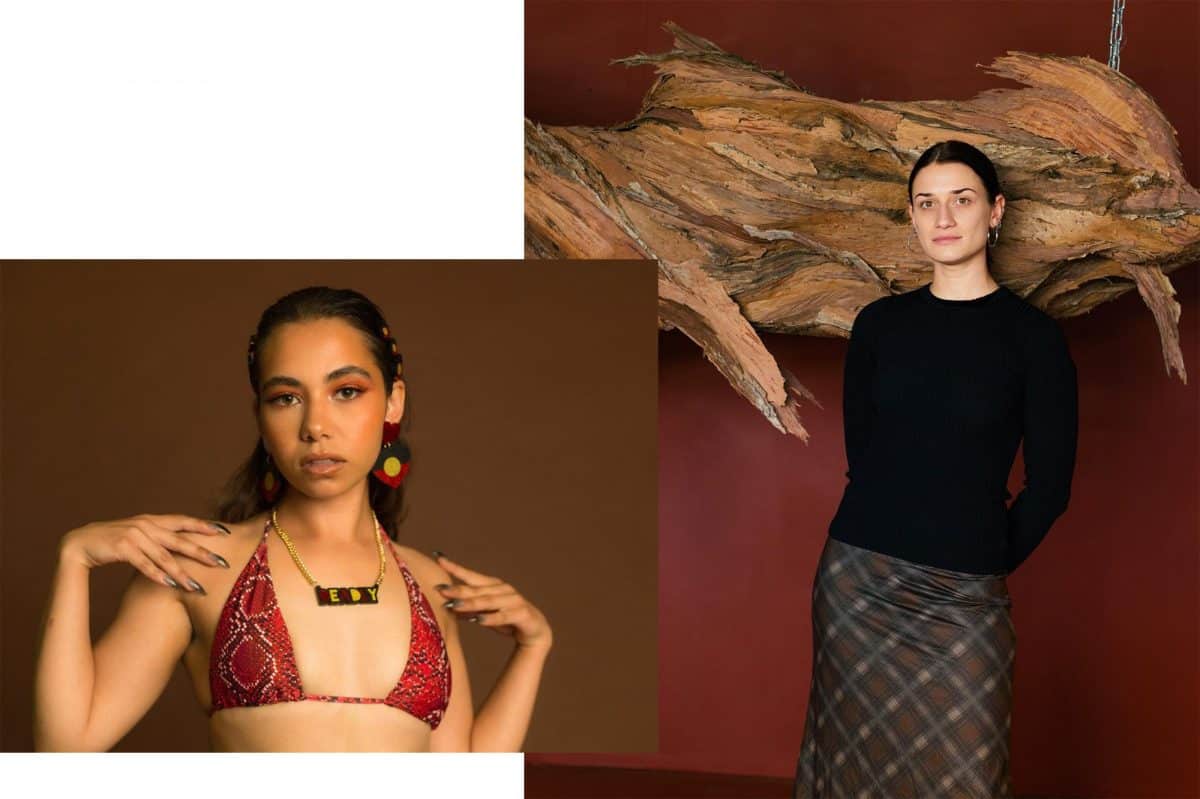
Nakkiah Lui is a master storyteller. Her CV is a testament to this, wearing the hat of writer, director, playwright, publisher, comedian and actor at various points throughout her career. For her latest project, a seven-part series with Audible called First Eat, Lui returns to podcasting, having experimented with the medium for previous shows Pretty for an Aboriginal and Debutantes. She's tackled the subjects of race, sex and power, dipped into First Nations debutantes, and in First Eat, Lui embarks on answering the question: what would a plate of food look like if First Nations people owned the land?
The resulting podcast is part memoir, part docu-series that interrogates the multilayered relationship between First Nations Australians, food and colonisation. Lui brings on a cast of friends, family, experts, elders and chefs to help her paint a comprehensive picture; including her mother, Gomeroi woman Jenny Beale, close friend, Miranda Tapsell, as well as ex Rockpool and Nomad chef, Jayde Harris, and Wiradjuri lawyer Taylah Gray.
As the podcaster tells RUSSH, "I consider myself politically aware and active; I come from a family of activists and community workers who are very proud of our culture and our history as First Nations people. I can tell you the land I'm from, the land I'm on today," she says. "But there's a huge gap in my knowledge as a First Nations person when it comes to native flora and fauna."
It was the birth of Lui's daughter Lux that sparked her pursuit for answers, which saw the host of First Eat travel across Australia to Bundjalung country, cross the ditch to Aotearoa and catch a plane to Oakland, California to visit the kitchen of Kickapoo woman Crystal Wahpepah. Like most new parents, Lui began to contemplate the traditions she hoped to pass down to her child, part of which included language. But this line of thought exposed how little she knew about native ingredients, and how do you define Aboriginal and Torres Strait Islander food, anyway? "I'm a big believer in the personal is political, and you don't get much more personal than food," Lui says.
On the podcast and over the phone, Lui shares how her first memory of food revolves around rabbit stew, a comfort dish her mother and nana would make. "We would be in the housing commission home in St Marys that my nana and pop lived in and I'd be eating rabbit stew with my pop, who was older and sick at the time. Both of them would always tell me 'pop went and caught the rabbit himself' and I believed it," she laughs.
The meal would've looked different to the rabbit stew her mother, Jenny Beale, grew up eating on Country, Lui explains, since Beale would forage and farm the vegetables, along with catching, skinning and cooking the rabbit herself. It also differed to dishes Lui's family on Bundjalung country ate, where seafood like pippis are a mainstay, even further still from the crab and shellfish Miranda Tapsell would collect with her cousins further north in Darwin. In this way, Lui captures the diversity in First Nations food cultures.
In one episode of First Eat, Nakkiah speaks about her love for fine-dining, and how it is the single thing her husband, who can be frugal with money, allows himself to splurge on. From their first initial dates to now, the pair frequently dine at hatted and Michelin-starred restaurants. During these experiences, Lui noted the growing presence of native ingredients on the menu but found it jarring the way these would be divorced from traditional cooking practices. It's one thing to cook with native ingredients, it's another to understand these ingredients in their ancestral context.
Through her research for First Eat, Lui also investigates the way food has also been used as a means to oppress First Nations people in this country, be it through rations or displacement and dispossession. One crucial learning moment for Lui came when she delved into the history of Australia's sugar industry, explaining how the once-booming trade was built off the back of indentured South Sea Islander slaves in a practice known as blackbirding. Later, the indentured labourers were deported, despite their significant role in propping up Australia's economy.
Health is an unavoidable part of this conversation around colonisation and food, considering the life expectancy for Aboriginal and Torres Strait peoples is around eight years lower than settler Australians. In First Eat, it's not discussed in abstract terms either; over the years Lui has publicly spoken of her own feelings and experiences surrounding her body and health journey, which has included weight loss surgery, and links the impact of flour and sugar to her family's history of diabetes and obesity. In First Eat, Lui shares her concern that the food she is eating is making her sick, during which episode she expresses her wish to prevent Lux from inheriting her own complicated feelings towards food.
This leads Lui to encounter the activism taking place on the outskirts, where First Nations people are creating pockets of sovereignty, such as the Yawuru people in Western Australia, who took back Roebuck Plains Station in 2022 and have since implemented their own cultural farming practices; or Sani and Hope Simei-Papali’i, founders of Yawye (You Are What You Eat), who are decolonising the palate with their Māori and Pasifika baby food. All roads inevitably lead listeners to contemplate the role of land ownership in a world where First Nations people have sovereignty over what they eat, how its produced and from what lands.
Nakkiah Lui explains how in her family, and many other Aboriginal and Torres Strait Islander families, food has always been linked to a sense of place. "Most of my family had very little freedom about where they got to call home and how we ended up in that little dining room in that fibro house in Mount Druitt," she says. "What we did have choice over was the rituals that we shared with each other. I grew up in a home where every Friday we got to have a meal and tell stories, laugh and share. We would order Chinese food from the local restaurant – fried rice and honey chicken – because my nan knew the owners."
Ultimately, it's this tradition that Lui hopes to pass down to her daughter Lux: the act of sharing, whether that's food, stories, a listening ear. And she's starting with First Eat.
First Eat is available to listen to now on Audible.



